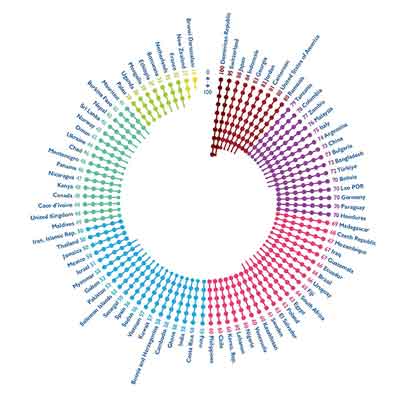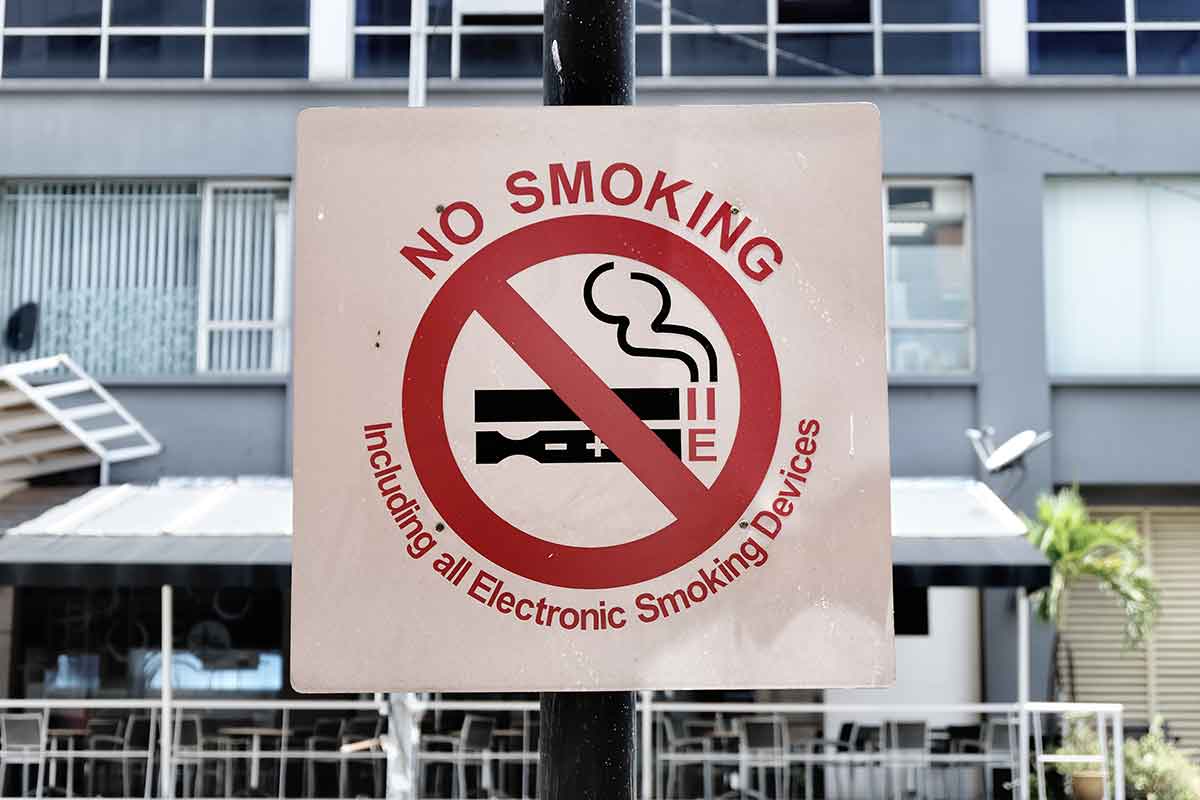- Resources
- News
-
-
Get Email Updates
Sign up for STOP's emails and never miss an update on our latest work and the tobacco industry's activity.
-
Get Funding
Ready to tackle industry interference? You could be eligible for a grant.
-
Share a Tip
Do you have information on tobacco industry misconduct in your country? Let us know.
-
Get Email Updates
Sabotaging Policy
November 14, 2023

Read this press release in Spanish, French, Bengali or Indonesian.
Global Tobacco Industry Interference Index 2023 ranks 90 countries; reveals industry tactics that include promoting electronic products and hiding environmental damage.
(New York, United States, and Bangkok, Thailand, November 14, 2023) — Governments around the world continue to be influenced by powerful tobacco companies that hinder efforts to reduce tobacco use. They are not taking sufficient measures to protect policy from the tobacco industry as required under Article 5.3 of a global treaty, the WHO Framework Convention on Tobacco Control (WHO FCTC).
A new report from STOP and the Global Center for Good Governance in Tobacco Control (GGTC), The Global Tobacco Industry Interference Index 2023, reveals a worsening trend. Analysis from civil society organizations shows a deterioration in the scores for more than half (43) of the 80 countries analyzed in the 2021 report, while 29 improved their score. No country was immune to the industry’s intensified efforts to sway policy and policymakers to its advantage, with tactics including aggressive lobbying to create acceptance for electronic products and significant efforts to hide environmental damage caused by both cigarettes and electronic products. Key findings include:
- Brunei Darussalam, New Zealand, France, the Netherlands and Botswana ranked best overall.
- The worst-scoring countries were the Dominican Republic, Switzerland, Japan and Indonesia—all countries in which the industry has a significant presence.
- The most improved scores were recorded by Ukraine, Botswana, Burkina Faso and Ethiopia. As the industry increasingly targets African consumers, progress in protecting policy across the continent is particularly urgent.
- Within each region, there are significant differences in scores between the best- and worst-performing governments.
- Countries that have not ratified the WHO FCTC, including Argentina and the U.S.A., face high levels of industry meddling.
“The tobacco industry is aggressive in sabotaging government efforts to strengthen tobacco control,” said Mary Assunta, PhD, Head of Global Research and Advocacy for the Global Center for Good Governance in Tobacco Control, a partner in the STOP network and lead author of the Index. “This report confirms that there is no room for complacency; the key to arresting industry interference lies in the hands of governments. They must use Article 5.3 which will empower them to do their utmost to stop the 8 million preventable tobacco-related deaths every year.”
Key trends include the industry aggressively seeking to create favorable conditions for new addictive products such as e-cigarettes, heated tobacco products (HTPs) and nicotine pouches:
- Tobacco companies successfully lobbied for the end of bans on e-cigarettes, HTPs and/or nicotine pouches in Egypt, Kenya and Uruguay. In Uruguay, the Ministry of Public Health used industry-friendly information provided by Philip Morris International (PMI) instead of information prepared by its own experts.
- Policymakers in Malaysia de-listed nicotine as a poison from the National Poison Act after Japan Tobacco International called for the Act to be amended.
- In Italy, a proposal for stronger regulation of e-cigarettes and HTPs was successfully opposed by policymakers who received funding from e-cigarette companies.
- The Philippines approved an industry-friendly e-cigarette law.
Amid growing alarm at e-cigarette waste and calls for cigarette filters to be banned as toxic, single-use plastics, the industry stepped up activities to hide its environmental harms:
- In at least 15 countries including Brazil, Colombia, Costa Rica, Korea, Malaysia, Sweden, Switzerland and Uruguay, industry-led cigarette butt litter cleanups secured the endorsement of governments and public institutions.
- In Costa Rica, a PMI-sponsored activity coincided with the Legislative Assembly’s debate on a bill to declare cigarette butts as special waste and place the responsibility for their disposal on the manufacturer or importer.
- Local or national governments in 10 countries including Bangladesh, Bosnia and Herzegovina, India, Indonesia, Jamaica, Jordan, Madagascar, Pakistan, Sri Lanka and Zambia entered into partnerships with or endorsed industry-sponsored tree planting programs.
Beyond national policymaking, the industry targeted delegations to global treaty discussions, specifically the 9th Conference of the Parties (COP) to the World Health Organization Framework Convention on Tobacco Control (FCTC).
“The industry’s ‘corporate social responsibility’ handouts to impress policymakers is a pittance compared to the cost of the harm it causes, what governments could be collecting in tax revenues and the tens of billions of dollars in profits enjoyed by global tobacco companies,” concluded Assunta. “Governments must stop believing the industry’s spin and hold it accountable instead.”
The Global Tobacco Industry Interference Index is available at exposetobacco.org/global-index/.
Please contact the STOP press office for more information or to speak to a STOP spokesperson.
Notes to Editors
Additional report highlights by topic:
Resisting industry interference
- Ukraine implemented a comprehensive policy to reduce tobacco use and countered industry attempts both to delay that law and reverse a ban on tobacco product advertising.
- Botswana and Burkina Faso both took steps to increase transparency, reject industry collaboration and protect policy.
- Argentina, Brazil, Mexico, Nicaragua and Panama banned e-cigarettes and HTPs despite industry pressure and Thailand resisted lobbying by a group linked to the PMI-funded Foundation for a Smoke-Free World to revoke its ban on e-cigarettes.
Impact on policy
- At a national level, Bolivia, Guatemala, Jamaica, Tanzania and Zambia report that industry interference significantly delayed efforts to pass comprehensive laws to reduce tobacco use.
- A bill in Switzerland to protect youth from tobacco advertising was watered down and its implementation pushed to 2026.
- Bangladesh, Chad, LAO PDR and Nigeria delayed the implementation of graphic health warnings on tobacco packaging.
Tax breaks and subsidies
- Amid a global cost-of-living crisis, wealthy cigarette corporations were given tax breaks and subsidies, depriving countries of revenue that could be used to support domestic priorities.
- Colombia, Malaysia (for the eighth consecutive year), Mongolia, Switzerland and Türkiye did not increase tobacco taxes.
- The industry was given rebates, benefits or exemptions from certain taxes or tax laws in Argentina, El Salvador, Iraq and Madagascar and tobacco growing was subsidized in Indonesia, Lebanon, Montenegro, the Philippines, Switzerland, Tanzania and Uruguay.
Corporate social responsibility activities and donations
- Of 40 countries in the report that ban tobacco-related corporate social responsibility activities or don’t endorse or accept contributions from the industry, more than half (25) accepted or endorsed industry contributions. In some cases the industry acted through civil society groups.
- Cambodia, Indonesia, Jamaica, Madagascar, Montenegro, Paraguay and Vietnam accepted tobacco company donations of medical supplies or contributions to health funds.
About the Global Tobacco Industry Interference Index (Global Tobacco Index)
The Global Tobacco Index is a global survey on how governments are responding to tobacco industry interference and protecting their public health policies from commercial and vested interests, as required under the WHO Framework Convention on Tobacco Control. The Global Tobacco Index was first produced by the Global Center for Good Governance in Tobacco Control (GGTC) in 2019 as part of tobacco industry watchdog, STOP. The Global Tobacco Index 2023 is the fourth edition of the report.
Methodology
Civil society groups gather information that is in the public domain to answer a questionnaire based on Guidelines for Article 5.3 of the WHO FCTC, covering issues such as industry interference in policy development and implementation, conflicts of interest and access to senior government officials. A scoring system is applied to make the assessment, ranging from 0 – 5, where 5 indicates the highest level of industry interference and 1 is low or no interference. Countries are ranked according to the total scores provided by civil society groups. The lower the score, the lower the overall level of interference.
About STOP
STOP is a network of academic and public health organizations operating globally as part of the Bloomberg Initiative to Reduce Tobacco Use. STOP connects experts in all aspects of the tobacco industry’s business to expose and counter its relentless efforts to sell harmful, addictive products.
About The Global Center for Good Governance in Tobacco Control
The Global Center for Good Governance in Tobacco Control (GGTC) collaborates with advocates, governments, and institutions around the world to tackle the single greatest obstacle in tobacco control implementation: tobacco industry interference. Its mission is to empower change-makers by equipping them with cutting-edge strategies and tools so that the health and wellness of millions worldwide would not suffer at the hands of the tobacco industry. GGTC, based in Bangkok, Thailand, is a global initiative of the Southeast Asia Tobacco Control Alliance (SEATCA).




